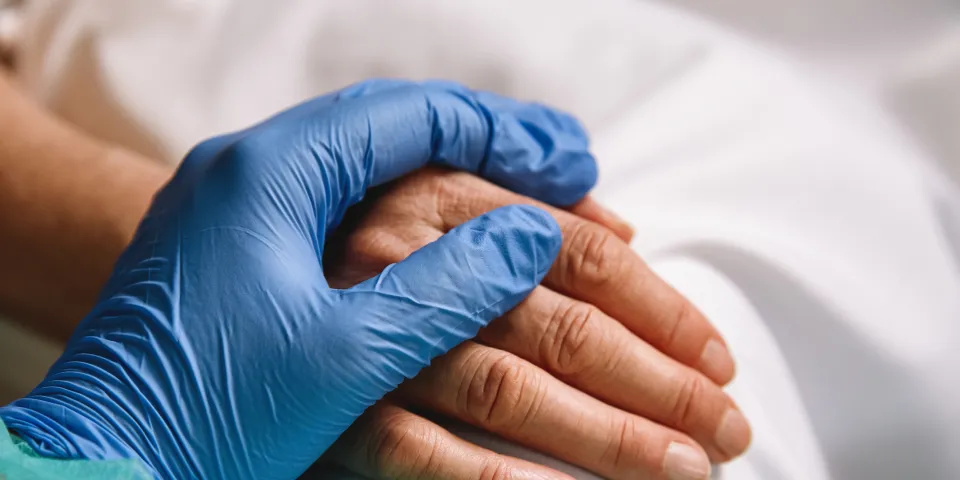Latest
Q&A Part 2: Becoming a Nurse during the Coronavirus Pandemic
Jan 25, 2021

This is the second part in a series about Herzing graduates working during the pandemic. You can read the first post here.
During the coronavirus pandemic, nurses have been hailed as frontline heroes because they provide day-to-day care for patients stricken by the deadly virus while trying to keep themselves and other patients safe.
Student nurses who have graduated in the last year were going to school when the pandemic hit and started their careers in the midst of the healthcare crisis. We asked these recent Herzing grads about what it’s like to be on the frontlines:
- Vanessa Maybin, who earned her BSN from Herzing-Orlando in the spring of 2020 and started working as an RN at Advent Health Orlando. She has also served as a travel nurse, including at a convention center that had been converted into a field hospital for patients sick with coronavirus.
- Mackenzie Patrick, who earned her BSN from Herzing-Madison in January 2021. She has been working as a CNA at a local hospital for several years and will soon be an RN there.
Here is a look at how they have adapted to working during a pandemic:
1. What changed with nursing school and your job since the pandemic started?
Vanessa: Overall, I think that patient education and empathy have come to the forefront during the pandemic, as well as the importance of the character traits of adaptability and flexibility in a nurse.
Nowadays I find myself working a lot more hours – often five or six 12-hour shifts a week due to many facilities feeling the burden of staff shortages and increased patient populations.
Despite this, high-quality care must still be provided. I’ve noticed that I’m doing more education with patients. Many of them have comorbidities, so we have to talk about taking care of their diabetes or other conditions while they’re sick with coronavirus. I’m also working more closely with our respiratory therapists. Teamwork is imperative to improving patient care, especially with multidisciplinary professionals. I ask a lot of questions and learn from them so that I can truly understand what’s going on with my patients and provide holistic care.
Since I’m working directly with COVID patients in a converted field hospital, I have to be extremely cautious. However, I’ve also become more empathetic and understanding. I see these patients day in and day out, and since they can’t have visitors in person, we have to find alternative ways for them to connect. I build rapport with them, share jokes and stories. While the pandemic is difficult, it has shown the humanity in us all and pushed each person to hopefully be better versions of themselves.
Mackenzie: I work as a CNA in the med-surge/ICU unit of a local hospital. One of the most obvious changes for me is that I spend the first half-hour of each shift taking inventory of our personal protective equipment (PPE) and making sure we have enough supplies for COVID and non-COVID units. I also spend more time making sure we have PPE stocked in patient rooms so that nurses and others aren’t running back and forth looking for supplies. I’m also working much more than usual. My 12-hour shifts are sometimes becoming 13-16 hours because it’s so busy.
At Herzing, I had been taking classes on campus but switched to online when the pandemic hit. I completed my summer clinicals via virtual simulation. It was an adjustment, but I was happy to stay on schedule.
2. What has been your biggest challenge working during the pandemic?
Vanessa: Change is constant during this pandemic and can be a challenge to maneuver. Before starting travel nursing, as a staff nurse, I was asked to work across different units and floors in the hospital. I worked wherever I was needed most. Units were often set up differently. Procedures varied or new information that changed clinical practice was given. Adaptability was imperative. This floating exposed me to many different specialties, patients and conditions and it allowed me the opportunity to gain knowledge in different areas quickly.
As a travel nurse, my biggest challenge has been walking into a new work environment and figuring out how it operates. Many of my coworkers come from different states and were trained differently. We all have similar knowledge and credentials, but we have different ways of delivering it and communicating with each other. Again, adaptability and flexibility are needed.
Mackenzie: My two biggest challenges have been adapting to rapidly changing situations and caring for dying patients who are isolated. It takes an emotional toll because visitors aren’t allowed in the hospital.
3. What has been most rewarding?
Vanessa: I love the community that comes with nursing. Even as a travel nurse there is a sense of community. I truly enjoy meeting new nurses, hearing about their experiences and learning from them.
The pandemic also helped open my eyes to travel nursing opportunities that I didn’t expect to love so much. I like that it allows me to try new things while giving me control and flexibility in my work environment and schedule.
Mackenzie: It’s been incredible to see how quickly our staff and the entire community came together. Everyone has been so supportive!
4. Did the pandemic change how you feel about becoming a nurse at all?
Vanessa: Nursing school taught me to be an advocate for my patients, but the pandemic has taught me to be an advocate for myself. That means saying no to extra shifts when I need the rest, working within my means and more.
Mackenzie: The pandemic has made me more eager to become a nurse so that I can help my community and my coworkers. Working as a CNA, there were times I wished that I could help our nurses more, but we had strict protocols in place and I didn’t have access to medications they often needed.
5. What is it about being a nurse that helps you get through times like these?
Vanessa: I love caring for people. As long as I’m taking care of people, I’ll be happy. The fact that my career aligns with my personal purpose makes it even better.
Mackenzie: Being able to help people is what carries me through. About nine years ago, my mom was diagnosed with lung cancer. Watching how nurses took care of her inspired me to become one. I actually work with a nurse now who cared for my mom during that time, and my mom still remembers her because of the impact she had on her life. I aspire to be that kind of nurse.
6. What advice do you have for others considering becoming a nurse right now?
Vanessa: Nursing school will properly prepare you for the job, regardless of the pandemic, so don’t be deterred! If you’re in school, just keep going. Make the sacrifices you need to now to enjoy the rewards and your career later. Lastly, don’t be afraid to ask questions whether in class, at clinicals or on the job.
Mackenzie: Nursing school is hard and you’re going to run into challenges, but there’s always an end in sight. Learning how to get through the hard days is part of your training. Additionally, make sure to find a solid support system and take care of yourself by taking time off when you need it.
Learn More About Our Nursing Programs
Bureau of Labor Statistics (BLS), U.S. Department of Labor, Occupational Employment and Wage Statistics 2023 / Occupational Outlook Handbook 2022. BLS estimates do not represent entry-level wages and/or salaries. Multiple factors, including prior experience, age, geography market in which you want to work and degree field, will affect career outcomes and earnings. Herzing neither represents that its graduates will earn the average salaries calculated by BLS for a particular job nor guarantees that graduation from its program will result in a job, promotion, salary increase or other career growth.
Latest
Recent Blog Posts
Subscribe to our Newsletter
Get the latest news you need to know, from study hacks to interview tips to career advancement. Have it delivered right to your inbox biweekly.








